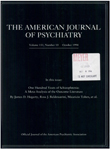Quantitative assessment of the behavior of psychotherapy supervisors
Abstract
OBJECTIVE: The aim of this study was to explore the behavior of psychotherapy supervisors by using the Psychotherapy Supervision Inventory. METHOD: The authors used the Psychotherapy Supervision Inventory to rate 53 videotaped supervision sessions of 34 different supervisors. They also used the variable of the rater's perception of the excellence of the supervisor as a teacher. The data were subjected to a cluster analysis and a K-means analysis. Discriminant function analyses were applied to the comparison of the behavior of 19 supervisors with two different residents and the behavior of all 34 supervisors with residents in three different years of training. The relationship between rater-perceived excellence and Psychotherapy Supervision Inventory scores was analyzed by using stepwise multiple regression. RESULTS: There was a high level of agreement among the four raters' judgments of supervisors' excellence. Empathy accounted for 72% of the variance in rater-perceived excellence and focus on the therapist accounted for an additional 5%. When empathy was dropped from the equation, experiential orientation accounted for 60% of the variance in ratings of excellence, clarification and interpretation accounted for an additional 16%, and depth accounted for another 3%. CONCLUSIONS: In the context of established relationships, supervisors have stable behavior patterns. Rater-perceived excellence is related to the supervisor's focusing on the resident's immediate experiences and making many synthesizing comments in depth. The Psychotherapy Supervision Inventory can be used to orient supervisors to supervision and provide feedback about their behavior.
Access content
To read the fulltext, please use one of the options below to sign in or purchase access.- Personal login
- Institutional Login
- Sign in via OpenAthens
- Register for access
-
Please login/register if you wish to pair your device and check access availability.
Not a subscriber?
PsychiatryOnline subscription options offer access to the DSM-5 library, books, journals, CME, and patient resources. This all-in-one virtual library provides psychiatrists and mental health professionals with key resources for diagnosis, treatment, research, and professional development.
Need more help? PsychiatryOnline Customer Service may be reached by emailing [email protected] or by calling 800-368-5777 (in the U.S.) or 703-907-7322 (outside the U.S.).



